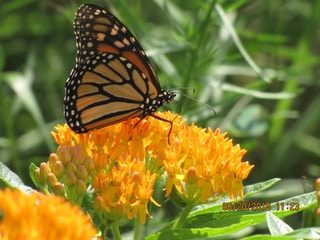Today’s Author: Carol Swanson
As I pull a few weeds and dig in the soil, prepping to move a plant, I think about last Sunday’s theme “God’s Work, Our Hands,” a call to partnership with our loving and gracious God in what we do. Robbin Wall Kimmerer writes, “In a garden, food arises from partnership. If I don’t pick rocks and pull weeds, I’m not fulfilling my end of the bargain.” (p 126)
How does “God’s Work, Our Hands” influence our reading of Genesis 1:26? God says, “Let us make humankind in our image, according to our likeness; and let them have dominion over the fish…the birds…the cattle…the wild animals…and very creeping thing that creeps upon the earth.” How should we think about “Dominion” and “stewardship”?

I think “Dominion” and the related verb “to dominate” must make us reflect on what we have been doing to the earth these last couple of centuries since the start of the Industrial Revolution. Are we starting to grasp the negative consequences of our actions? “Stewardship” has become the preferred word to discuss our role in creation. According to my dictionary a steward is “One who is entrusted with the management of property…not of his own; an administrator.” Are we being good managers—God’s hands—for God’s earth?
Robin emphasizes the crucial themes of indigenous creation stories and traditions.
1. The Plants and Animals are our teachers. They have been around much longer than we have, and we are the Youngsters on the planet. “Plants know how to make food from light and water. Not only do they feed themselves, but they make enough to sustain the lives of all the rest of us. Plants…exemplify the virtue of generosity, always offering food.” (p 346)
2. The plants and animals give themselves to us. “What would it be like, I wondered, to live with that heightened sensitivity to the lives given for ours? To consider the tree in the Kleenex, the algae in the toothpaste, the oaks in the floor, the grapes in the wine; to follow back the thread of life in everything and pay it with respect? Once you start, it’s hard to stop, and you begin to feel yourself awash in gifts.” (p 154)
3. Our response should be gratitude and reciprocity. “Reciprocity helps resolve the moral tension of taking a life by giving in return something of value that sustains the ones who sustain us. One of our responsibilities as human people is to find way to enter into reciprocity with the more-than-human world. We can do it through gratitude, through ceremony, through land stewardship, science, art, and in everyday acts of practical reverence.” (p 190)
An article “The Fullness Thereof: How Indigenous worldviews offer hope to a besieged planet” by Randy Woodley (author of Shalom and the Community of Creation: An Indigenous Vision) appeared in Sojourners Magazine, May 2019. In it he reminds us that the Biblical writers and Jesus shared a worldview much closer to the way our indigenous population thinks. “Jesus understood humanity’s relationship with the earth differently than we do. He spoke to the wind, to the water, and to the trees; closely observed the habits of birds, flowers, and animals; and called his disciples to model their lives after what they saw in nature.” We see “Jesus’ view of the whole world, including earth and heaven, as sacred. …he certainly understood the relatedness of both (‘on earth as it is in heaven’).” (p 16)
Randy sees our responsibility as stewards in this way. “Each area of creation is working with the Creator to maintain earth’s balance. The rain and the snow, oceans and sun all sustain life on earth. Animals regulate each other within their various natural cycles. Plants provide oxygen, food, and shelter for all of creation to coexist together. As human beings, we are co-sustainers with the rest of creation to ensure the abundant life for all creation the Creator intended. And God said that is good.” (p17)
But ask the animals what they think—let them teach you;
let the birds tell you what’s going on.
Put your ear to the earth—learn the basics.
Listen—the fish in the ocean will tell you their stories.
Isn’t it clear that they all know and agree
That God is sovereign, that he holds all things in his hand—
Every living soul, yes,
Every breathing creature?
Job 12:7-10 (The Message)
Let us pray:
Gracious Creator, deepen our love and gratitude for all your creation as we see ourselves as part of nature’s community. Amen.
“Mid-week devotions are authored by members of our community. If you are interested in creating a trio of reflections to be shared on an upcoming Tuesday, Wednesday, and Thursday contact Pastor Peter.“
